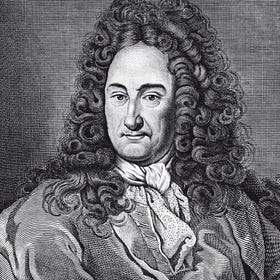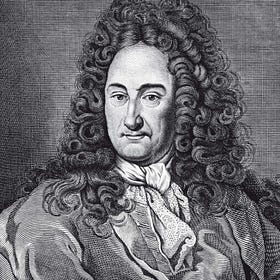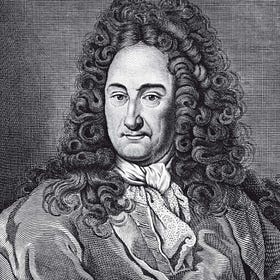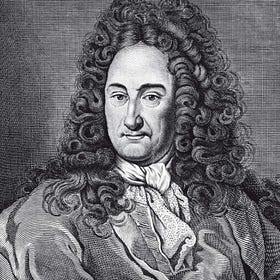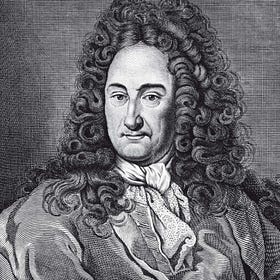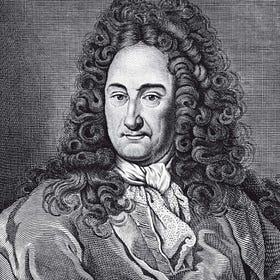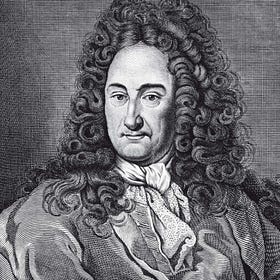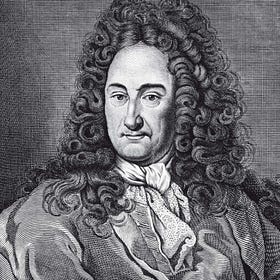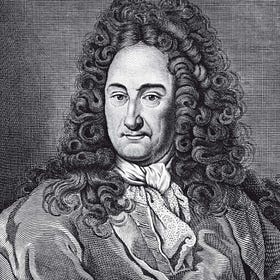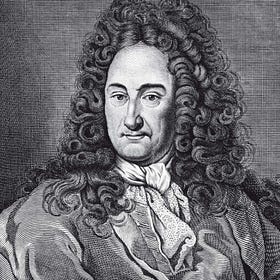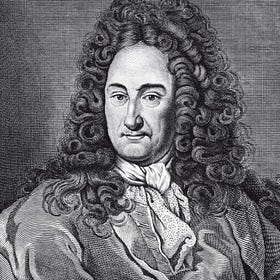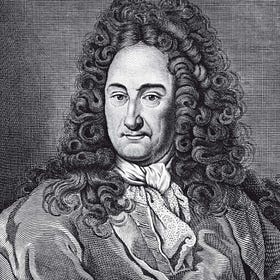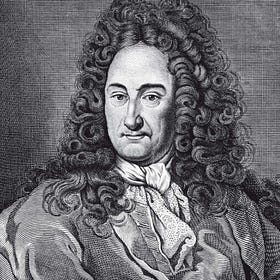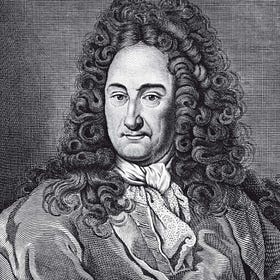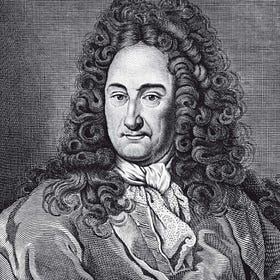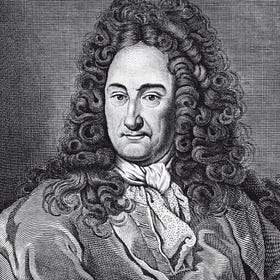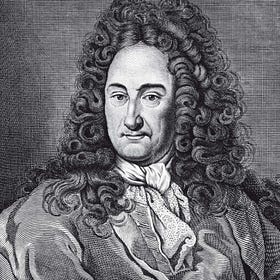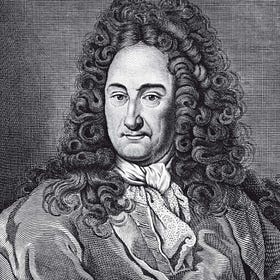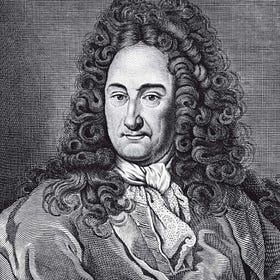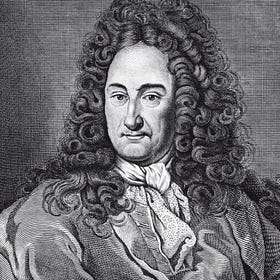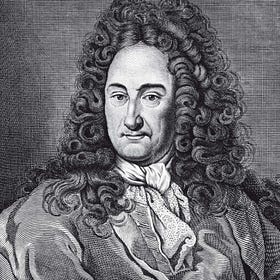Leibniz’s Theodicy Redux
Leibniz, Classical Theism, and the Problem of Evil - Chapter 7 (1 of 3)
Greetings, subscribers. As followers of Theological Letters know, I spent much of this last year writing a forthcoming book on Leibniz and the problem of evil, and I have been posting fresh installments from that work every Sunday.
To date, I have posted the Introduction and all of Part I — Chapters 1, 2, 3, 4, 5, and 6. Today, I post the first installment of Chapter 7, Leibniz’s Theodicy Redux.
If you have yet to read all that comes before, I recommend you do so for context. Links to all prior sections are below. Be watching for the first installment of Chapter 7 next Sunday. Enjoy!
To all my subscribers, thank you for subscribing. To my paid subscribers, thank you for your support. And to any visitors, please consider subscribing and supporting my work. Enjoy!
Leibniz’s Theodicy Redux
One has no need of infinite knowledge in order to see that the foreknowledge and providence of God allow freedom to our actions, since God has foreseen those actions in his ideas, just as they are, that is, free.
— Leibniz (G 6:331/H 343)
We began this journey through Leibniz with a look at how his theodicy unfolds. We saw how the philosopher of Leipzig’s commitment to the Principle of Sufficient Reason (PSR) leads him to ground all truths in God and how his rationalist portrait of the deity leads inexorably down the road of optimism. Within Leibniz’s recapitulation of the Great Chain of Being, his philosophy of organism, and his monadology, we saw precisely what it means to speak of “the best”: God fills up our world with as much being as possible, articulating his own boundless perfection in an infinite series of finite refractions — organisms within organisms, mirrors within mirrors, all receding into an infinity of being and goodness. Yet, as we also saw, Leibniz rejects the theory that all which can be is, arguing instead for divine choice. Possibles are no simple matter but comprise vast webs of logical incompatibilities and entailments, such that not even God can bring about every good or prevent every evil. Hence, the best is not a simple matter of raw power but of divine Wisdom, God discerning the maximal set of goods and what evils must be permitted when bringing about this optimal world.
For all of the ink Leibniz pours out in his defense, at the conclusion of this journey we found a troubling thread that if pulled, threatens to unravel the whole of his theodicy, namely, free will. Time and again, we saw how the philosopher’s commitments to rationalism threaten to undermine the very notion of contrary choice, making every action by both God and creatures absolutely necessary. And though such a bitter pill may be willingly choked down by Spinoza, Leibniz cannot swallow such medicine. To do so would not only mark a definitive break with the Christian tradition he professes to defend but also undermine each step of his theodicy. For his defense continually looks to freedom as its sole means of laying evil at the feet of creatures. Yet, the demands of rationalism cast a dark shadow over Leibniz’s thought, threatening to rip the teeth from his every effort to prop up contingency against the blustering winds of necessity.
Yet, in the interest of rescuing Leibniz from not only the storm of necessity but also incoherence, we sought resources by which to see if a libertarian Leibniz might be found — a Leibniz who can cogently maintain his various distinctions meant to stay necessity and preserve contingency. Looking back on Leibniz’s predecessors, we saw that optimism is not Leibniz’s invention but his inheritance, and by drawing on such predecessors, we found resources by which to rethink Leibniz on freedom. The picture that emerged was of a Leibniz who harbors a more traditional view of free choice, one that, yes, grounds choice in reason and the nature of the acting agent, but leaves room for free spontaneity and dynamic choice — choice that satisfies PSR while also leaving room for alternative possibilities, in both God and creatures.
Entertaining this libertarian Leibniz, however, raises a question. What does his notorious theodicy look like when read in a libertarian way? In what follows, we will examine the contours of his theodicy through these alternative lenses. We will begin by rehashing the basic structures of the defense,1 and then, upon this architecture, we will reconstruct his theory of possible worlds under the presumption of libertarian freedom. Finally, with this reconstruction in hand, we will revisit a question that so often troubles readers of Leibniz: Could God not create a world so good as ours but without sin and suffering? Such a question is no doubt thorny when presuming that every logically possible world is available to God, but our libertarian reconstruction offers a very different picture of what is possible. So, we will consider anew this rather irksome question in the light of our alternative reading.
Leibniz’s Theodicy in Overview
At the risk of reduncy, let us recount the road to optimism that set the stage for our rethinking Leibniz on freedom. We began with PSR, which lays the foundation for Leibniz’s optimism. In its primitive form, the principle is very much like the numerous arguments from contingency: By definition, contingencies depend on something beyond themselves for explanation. But to look for explanation in yet another contingency is to perpetuate the question rather than answer it. For every contingent link in the explanatory chain requires another. And lest we recede into an infinite regress of deference — a regress that can offer no sufficient reason for why the contingencies within this chain are so — the regress must terminate in something that is not dependent, in something that contains in itself the explanation for its existence. In a word, the only sufficient reason for contingent realities is God.
Arguments of this kind long predate Leibniz. But in his own day, they formed the basis for PSR in figures like Clarke and Spinoza. Yet, Leibniz, in characteristic fashion, expands the principle well beyond his contemporaries. Yes, contingent being requires necessary Being. Leibniz offers no objection. But his case goes well beyond this basic fact of ontology. Drawing a contrast between necessary and contingent truths, Leibniz shows that necessary truths contain an explanation for why they cannot be otherwise, namely, they reduce to identity. But contingent truths are immune to such reduction and thus void of demonstration. How, then, are we to bridge this yawning gap? For in the absence of such demonstration, the majority of human knowledge — about history and even the empirical sciences — is vulnerable, floating about without a foundation.
Here, PSR forces Leibniz back to God, as it did his contemporaries. Contingent truths require for their grounding an existential analytic truth — a truth about existence whose necessity is demonstrable. The demand points to God and specifically the ontological argument, the only argument to ever offer an existential analytic truth. But Leibniz believes the argument is incomplete in both the form offered by Anselm and by Descartes. Hence, he sets to work, “completing” the proof. Despite whatever idiosyncrasies might pervade the philosopher of Leipzig’s efforts, his goal is evident. By demonstrating the necessity of divine existence, we find the foundations of necessary being on which contingent being and truth might rest. Thus, to no surprise, Leibniz builds the whole of human understanding atop these divine foundations.
I say “the whole” because Leibniz does not merely lay empirical truths upon the shoulders of God but necessary truths as well. Like many of his predecessors, he embraces the notion that truths do not merely float in the air, as it were. Rather, even necessary truths must have ontological grounding, existing or else subsisting in something real. Hence, Leibniz grounds even truths of math and logic within the divine Mind. And here, we discover the structure of truth.
Like all Christian realists, Leibniz understands the structures of reason to reflect the Mind of God. Contradictions are not contradictions “for us” but are contradictions per se, displaying the structure of Reality. As for contingent truths, these proceed from the will of God. And yet, God’s decrees are not expressions of bare power but of power paired with Wisdom and Justice. Hence, these decrees reflect Wisdom. There is, then, no contradiction between necessary and contingent truths, nor between the truths of faith and the truths of reason, nor could there be. Truth is truth, proceeding from one and the same source.
The point is critical, not only to Leibniz’s optimism but also to PSR. In grounding every truth in God, Leibniz strives to avoid a ditch on either side of this narrow road. On the one side stands Spinoza, who accepts the necessity of God as the foundation of reality. But Spinoza understands the necessity to distribute to the world, swallowing up the whole of reality in a pit void of contingency. On the other side stands the Newtonians who ardently oppose the necessity of the rationalists. Yet, from their opposition arises caprice: Creation is an arbitrary act, void of explanation for why it is thus rather than otherwise. Ironically, Leibniz sees both dangers as a display of divine power void of Wisdom. Spinoza robs God, not only of freedom, but also his Wisdom to discern the best, for all that can be is — no choice is required. The Newtonians do the same but from the opposite vantage point. Theirs is a world of choice, but it is choice without Wisdom, snatched at random from the realm of possibility. What Leibniz believes is required to preserve God’s power and Wisdom is freedom — that is, reason paired with spontaneity. Only in this can we grant that God exercises both his power to create and his Wisdom to discern what is best.
Here, we discover the theory of the best. The theory requires two things. The first arises from the nature of God paired with the nature of freedom. As discussed, Leibniz echoes Medieval Faculty Psychology (MFP) with its belief that reason consists of intellect and will, the former offering judgments about the best means to a given end and the latter acting upon these judgments. Given God’s omniscience and omnibenevolence, there is no possibility that God might fail to discern the optimal means to any end or fail to incline toward this best over all competing goods. Hence the hypothetical necessity, if God creates a world, it will be the best possible world.
The second thing the theory requires, however, is the incompatibility of certain goods. In other words, if God chooses the best over alternatives, then there must be an explanation for why there are goods he foregoes. For God wills every good proportionate to its goodness, and in seeking to maximize goodness, he would presumably bring about every good were it possible. But Leibniz thinks it is evident that a great many goods are incompatible with one another. So, God must choose. And here we discover God’s Power paired with Wisdom, Goodness, and Justice. God does not merely produce every good in a display of power. Instead, knowing that not every good is compossible, God, in his Wisdom, discerns the greatest set, and in his Justice, he renders that set existence over all lesser worlds.
Now, the declaration that our world is best carries several meanings. The first is ontological. With classical Christian thought, Leibniz understands being to be good. Hence, the more being God produces, the more goodness fills our world. And by “being” Leibniz does not mean “stuff,” but intelligible properties. Hence, to speak of our world as optimal is to say, in part, that our world is comprised of a maximal set of intelligible properties. Such a notion is what gave rise to the classical concept of the Great Chain of Being, a concept that Leibniz echoes. So the case goes, our world is a hierarchy of beings, stretching from the most humble — such as rocks and plants — to the most godlike — man and angels. And within this hierarchy, we see not only ascending perfections but also diverse combinations of intelligible properties, maximizing the variety and complexity of intelligible being.
The Chain offers a finite articulation of the boundless perfection of God. In Leibniz, the notion is literal. Each being has a share in God’s infinite perfection but with negations that produce finitude. And the endless varieties of perfection with negation offer intelligibility to God’s boundless perfection, enabling finite minds to grasp the otherwise ungraspable. The vision offers an orchestral picture of reality. Much like the way the genius of a composer expresses itself through various instruments, each of a distinct nature, which offer a harmonious whole that is beyond any of their solo capacities, so the Chain of Being offers an endlessly complex variety of being that comprise a harmonious cosmos, which articulates in finite beings the infinite perfection of God. To speak of our world as best is to say, in part, that this Chain is an optimal cascade of goodness, refracting to a maximal degree the boundless Goodness of God in maximal variety, complexity, and harmony.
The vision is not unique to Leibniz, but as we saw, much like PSR, the philosopher of Leipzig presses the view well beyond the vision of the ancients. In both his philosophy of organism and his monadology, Leibniz argues for an infinitude of being. Moving from the problem of generation to a theory of preformation, Leibniz is impelled to a theory of organism such that organic beings are living machines comprised of smaller living machines that are comprised of smaller living machines on to infinity. Likewise, the monadology suggests that each building block of our world houses a nature that contains all that will ever happen to it, and from this Leibniz concludes that each monad is a small mirror of the cosmos, reflecting the whole from its unique vantage point. Here, the goodness of our world compounds. Much like the way a mirror duplicates the properties of that which it reflects, so Leibniz sees each monad as multiplying the goods of our world by means of its perception of the whole. Like an endless hall of mirrors, our world is comprised of countless monads, each mirroring the world from its own unique vantage point, producing further infinities within infinities.
Regardless of whether one is persuaded by Leibniz’s theory of organism or his theory of substance, the goal is evident. In declaring our world to be best, Leibniz has in mind, at least partly, something ontological. God wishes to express his infinite perfection in finite instruments, and our world is that optimal expression — a proliferation of endless intelligible properties, each combined in new varieties, cascading from the most godlike of beings to the most humble, all comprising a harmonious whole. Such is the message of the Great Chain of Being, a message that echoes in his philosophy organism and reverbates through the monadology.
Looming in the shadows of Leibniz’s optimism, however, is the problem of evil: How can an omnipotent, omnibenevolent being permit evil? The problem is made all the more potent by the theory of the best: How can evil find a place in the best of all worlds? The centerpiece of the philosopher’s defense is the same as his defense of divine choice. Not all goods are compossible, and this includes the good of preventing every evil.




